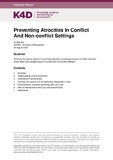| dc.contributor.author | Idris, Iffat | |
| dc.date.accessioned | 2022-10-03T15:41:09Z | |
| dc.date.available | 2022-10-03T15:41:09Z | |
| dc.date.issued | 2022-08-26 | |
| dc.identifier.citation | Idris, I. (2022). Preventing Atrocities in Conflict and Non-Conflict Settings. K4D Helpdesk Report 1191. Brighton, UK: Institute of Development Studies. DOI: 10.19088/K4D.2022.137 | en |
| dc.identifier.uri | https://opendocs.ids.ac.uk/opendocs/handle/20.500.12413/17678 | |
| dc.description.abstract | Atrocity prevention refers to activities to prevent atrocity crimes against civilians. These include genocide, war crimes, crimes against humanity and ethnic cleansing, and can take place in both conflict and non-conflict settings. This points to the need to prioritise and implement atrocity prevention specifically, and not just as part of conflict prevention efforts. Atrocity prevention interventions are broadly of two types: operational (short-term responses) and structural (addressing underlying causes/drivers). These encompass a wide range of approaches including: acting locally (with local actors taking the lead in prevention activities); tackling hate speech, and promoting an independent and strong media; documenting human rights violations, and prosecuting and punishing those responsible (establishing rule of law). The international community should prioritise atrocity prevention, but work in a united manner, take a comprehensive approach, and give the lead to local actors. Atrocity crimes generally develop in a process over time, and risk factors can be identified; these traits make atrocity prevention possible.
This rapid review looks at the concept of atrocity prevention, how it is distinct from conflict prevention, the different approaches taken to atrocity prevention, and the lessons learned from these. The review draws on a mixture of academic and grey literature, in particular reports produced by international development organisations such as the United Nations (UN) and USAID. The literature was largely gender-blind (with the exception of conflict-related sexual violence) and disability-blind. | en |
| dc.description.sponsorship | Foreign, Commonwealth and Development Office (FCDO) | en |
| dc.language.iso | en | en |
| dc.publisher | Institute of Development Studies | en |
| dc.relation.ispartofseries | K4D Helpdesk Report;1191 | |
| dc.rights.uri | https://www.nationalarchives.gov.uk/doc/open-government-licence/version/3/ | en |
| dc.title | Preventing Atrocities in Conflict and Non-conflict Settings | en |
| dc.type | Helpdesk | en |
| dc.rights.holder | © Crown copyright 2022 | en |
| dc.identifier.doi | 10.19088/K4D.2022.137 | |
| dcterms.dateAccepted | 2022-08 | |
| rioxxterms.funder | Default funder | en |
| rioxxterms.identifier.project | K4D | en |
| rioxxterms.version | VoR | en |
| rioxxterms.versionofrecord | 10.19088/K4D.2022.137 | en |
| rioxxterms.funder.project | 0986883a-6d0f-4bb8-9c46-5e0682934d65 | en |

